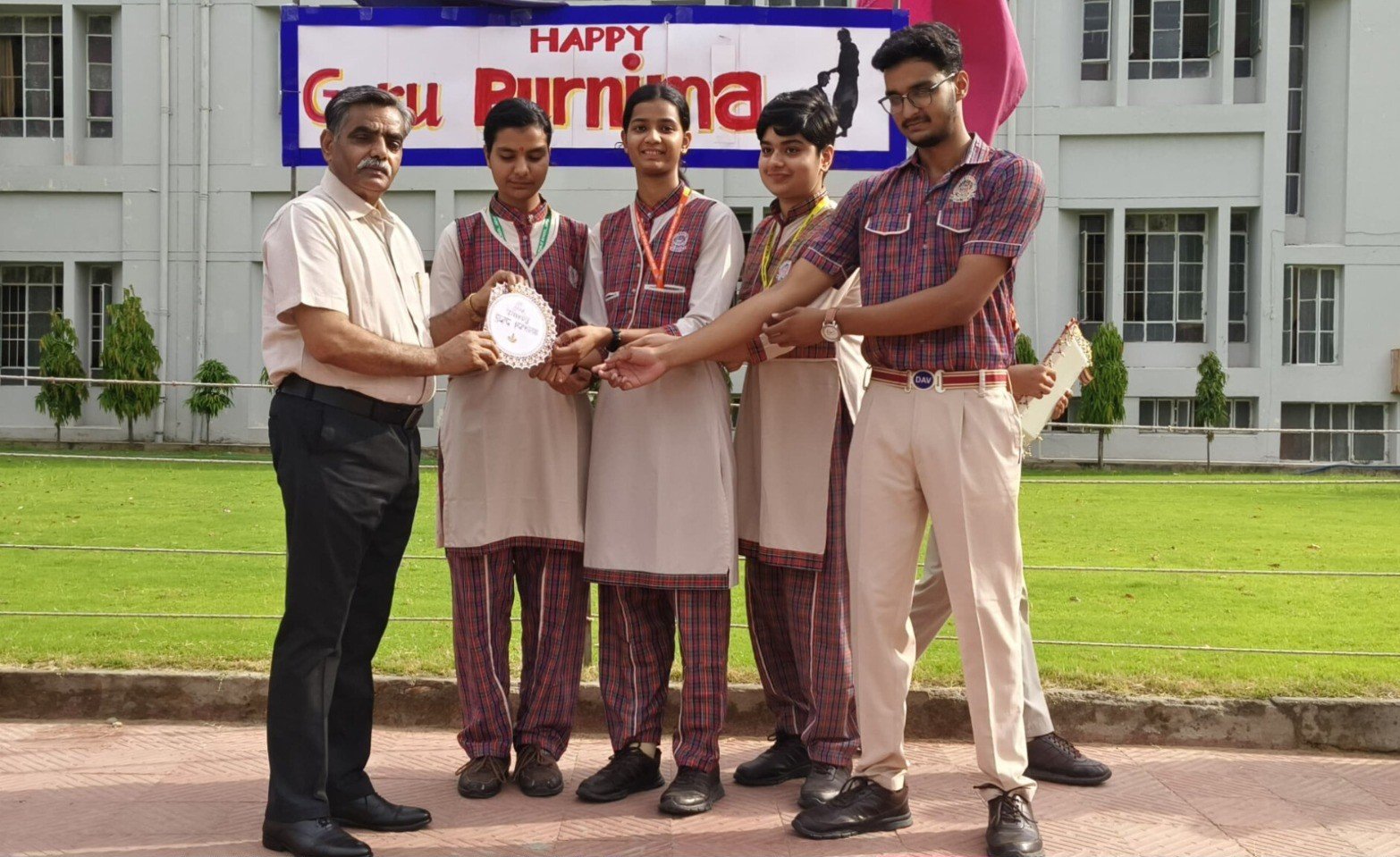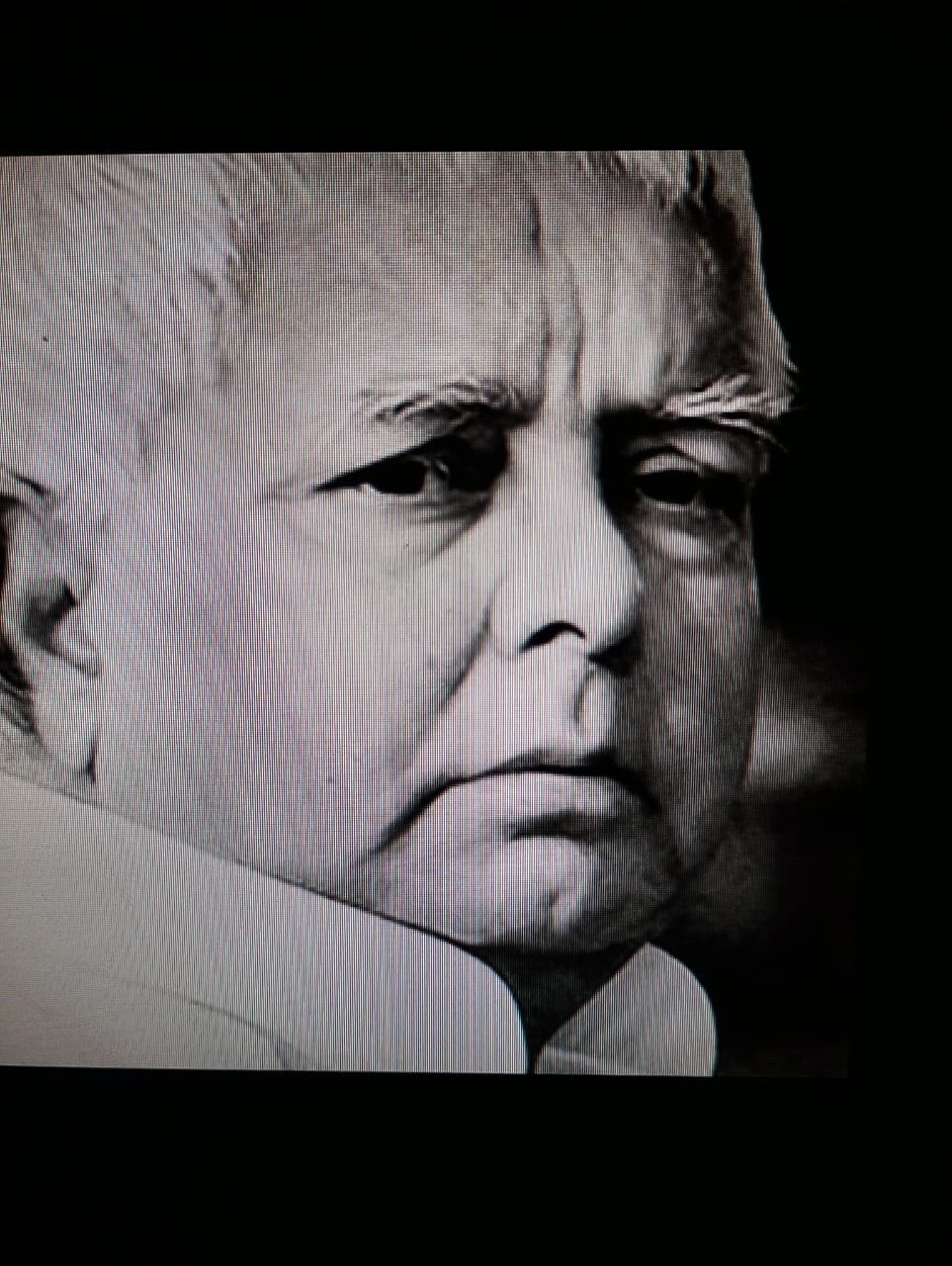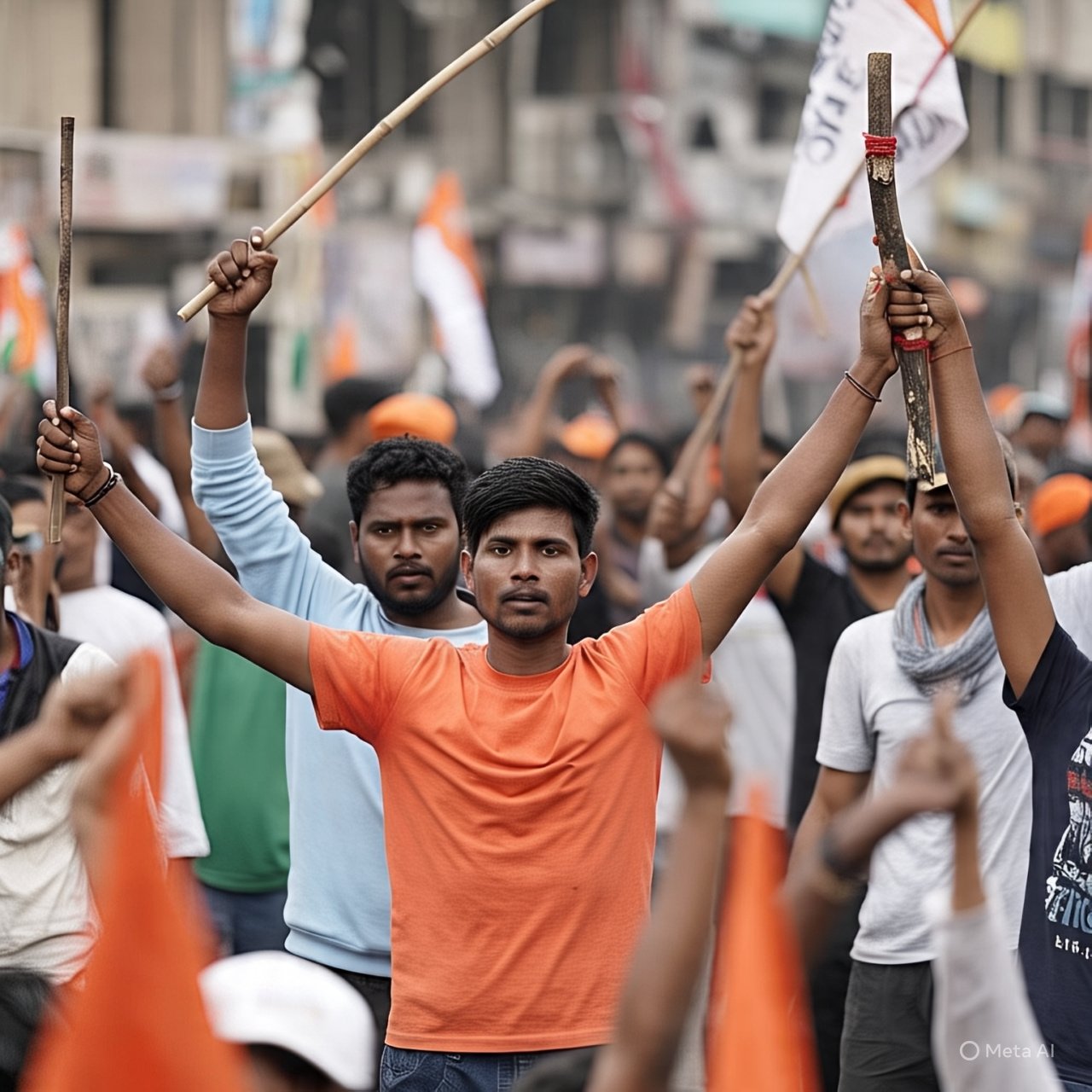India
Trump’s ‘America First’ Policy is Not America Alone: Insights from Tulsi Gabbard

Contents
Introduction to America’s Foreign Policy Landscape
America’s foreign policy has long been a reflection of its national interests, values, and strategic priorities. Over the years, the evolution of U.S. foreign relations has been significantly shaped by historical events, geopolitical dynamics, and ideological shifts. In the early years, the primary focus was on isolationism, as exemplified by George Washington’s farewell address warning against entangling alliances. However, as the nation grew economically and militarily, the need to engage with other countries became increasingly apparent.
The late 19th and early 20th centuries marked a turning point in American foreign policy. The Spanish-American War in 1898 and subsequent territorial expansions led to a more interventionist approach. This was further solidified during World War I, where America played a crucial role in shaping the post-war order. The interwar years introduced debates on isolationism versus interventionism, culminating in America’s eventual entry into World War II, which established the U.S. as a global superpower.
Post-World War II, the U.S. adopted a policy of containment to combat the spread of communism, leading to the formation of NATO and extensive involvement in conflicts such as the Korean and Vietnam Wars. During the Cold War, America’s foreign policy was marked by ideological confrontations, alliances, and proxy wars, which all contributed to defining international relations. The collapse of the Soviet Union in 1991 paved the way for a unipolar world where America emerged as the predominant global leader.
The turn of the century brought about new challenges, with terrorism and globalization reshaping the foreign policy landscape. It is within this context that President Donald Trump’s ‘America First’ policy emerged, heralding a shift towards nationalism and a reevaluation of America’s role in international affairs. This approach has rekindled debates regarding the balance between national interests and global responsibilities, prompting a reconsideration of alliances and commitments previously viewed as foundational to U.S. foreign policy.
Understanding Trump’s ‘America First’ Policy
Donald Trump’s ‘America First’ policy represents a significant shift in the United States’ approach to international relations, trade, and military engagement. Rooted in a strong nationalist sentiment, this policy aims to prioritize the interests of the American populace over global considerations, essentially reshaping how the country interacts with the rest of the world. Unlike previous administrations, which often championed multilateral agreements and global cooperation, Trump’s administration has embraced a more unilateral stance.
At the core of the ‘America First’ policy lies a conviction that the U.S. has been taken advantage of by other nations in various agreements and trade deals. This perspective has driven the administration to seek renegotiations or withdrawal from several treaties and organizations, such as the Paris Agreement on climate change and the Trans-Pacific Partnership. The rhetoric surrounding these decisions emphasizes the need to safeguard American jobs and industries from international competition deemed unfair.
Moreover, this policy reflects a broader trend towards nationalism, which gained traction during the Trump administration. Critics argue that this approach undermines the traditional role of the U.S. as a global leader and stabilizer. Trump’s foreign policy has distinctly prioritized American sovereignty, advocating for a situations-based analysis rather than adhering strictly to international norms. This has been evidenced through various military strategies and a pivot to a more transactional approach in diplomacy.
The implications of this policy extend beyond immediate economic impacts; they alter the foundational global order established after World War II. In contrast to the internationalist approach favored by prior administrations, the ‘America First’ doctrine posits that America’s interests necessitate a more self-centered and tactical foreign policy, allowing significant flexibility in dealing with international partners and adversaries alike. This transition signifies a reevaluation of America’s commitments to long-standing alliances and international agreements.
Tulsi Gabbard’s Perspective on ‘America First’
Tulsi Gabbard, the former congresswoman and military veteran, has articulated a critical stance regarding Donald Trump’s ‘America First’ policy. Her perspective underscores the divisiveness this approach engenders, both domestically and internationally. Gabbard contends that while prioritizing American interests is vital, such a unilateral strategy risks isolating the nation from its global allies and responsibilities. She emphasizes that the complexities of modern geopolitics cannot be navigated through an ‘us versus them’ mentality.
In her critiques, Gabbard highlights the significant implications of neglecting international partnerships. She argues that an excessive focus on nationalistic principles compromises the collaborative frameworks essential for addressing global challenges, such as climate change, terrorism, and pandemics. By fostering a mindset that dismisses foreign engagement, she believes the ‘America First’ policy inadvertently undermines America’s long-standing role as a leader on the world stage. For Gabbard, true strength lies in diplomacy, cooperation, and mutual respect among nations.
Ultimately, Gabbard’s insights challenge the prevailing notions associated with ‘America First.’ She calls for a broader understanding that recognizes the interconnectedness of nations and the necessity of global engagement as a pathway to sustainable peace and security. Through her arguments, Gabbard offers a compelling case for reevaluating the foundational tenets of U.S. foreign policy in an increasingly complex world.
The Impact of ‘America First’ on Global Alliances
Since its inception, the ‘America First’ policy championed by former President Donald Trump has sparked considerable debate regarding its implications for global alliances and partnerships. This policy marked a notable shift in American foreign relations, leaning towards a more unilateral approach that prioritized national interests over multilateral commitments. As a result, numerous historical alliances faced significant strain, raising questions about the future of worldwide cooperation.
One of the most prominent outcomes of the ‘America First’ approach was its impact on NATO, the North Atlantic Treaty Organization. The policy led to heightened tensions among member nations, with President Trump publicly criticizing allies for not meeting defense spending commitments. This prompted fears among NATO members regarding the United States’ willingness to uphold its security obligations, potentially undermining the collective security framework that has safeguarded Europe for decades.
Furthermore, the policy also influenced a range of international trade agreements. The withdrawal from the Trans-Pacific Partnership (TPP) and renegotiation of the North American Free Trade Agreement (NAFTA) serve as prime examples. Such actions not only strained relations with trade partners but also shifted the dynamics of global trade, prompting countries like China to seek greater influence in the absence of U.S. leadership. As a result, the perception of American reliability as a trade partner has been called into question.
The unilateral nature of the ‘America First’ policy has also been reflected in various international accords, such as the Paris Agreement on climate change. By exiting these multinational agreements, the United States signaled a retreat from its role as a global leader, raising concerns about the future of collaborative efforts in addressing pressing global issues.
As the world grapples with the fallout from these policy decisions, it is imperative to consider the long-term effects on international relations and collective security. The ‘America First’ stance illustrates that prioritizing national interests could come at the expense of vital alliances that are crucial for addressing global challenges. The evolving geopolitical landscape continues to emphasize the importance of balanced engagement and cooperation among nations.
Domestic Ramifications of ‘America First’
The ‘America First’ policy, introduced by former President Donald Trump, has significant implications for domestic policies in the United States. This approach emphasizes prioritizing American interests in economic, social, and political matters. One of the most notable impacts has been the implementation of tariffs on imports, which aimed to protect domestic industries from foreign competition. While this strategy was designed to boost job creation within the U.S. labor market, it has also led to increased prices for consumers. Critics argue that these tariffs have created retaliatory measures by other nations, potentially damaging sectors reliant on global trade.
Job creation, while touted as one of the main benefits of the ‘America First’ policy, has been met with both praise and skepticism. In specific industries, such as manufacturing, there have been reported increases in employment. However, the long-term sustainability of these jobs raises concerns, particularly given the shifting nature of the global economy. Some sectors have struggled to adapt as companies seek cost-effective solutions, including automation and offshoring, which may undermine the very objectives of the policy.
Immigration policies have also been heavily impacted by the ‘America First’ doctrine. Restrictions on immigration have been justified by the need to protect American workers, but such policies have led to significant labor shortages in industries reliant on immigrant labor, such as agriculture and hospitality. This has prompted discussions about the balance between securing borders and ensuring that sectors dependent on foreign workers can continue to thrive.
Furthermore, the ‘America First’ policy has created a polarized environment within the nation. Various sectors of society, including business leaders, labor unions, and civil rights organizations, have responded differently, with many advocating for a more inclusive approach that considers global interdependence. The potential backlash from these groups continues to challenge lawmakers as they navigate the complexities of domestic policies influenced by nationalism.
Critiques of Nationalism in ‘America First’
The ‘America First’ policy advocated by former President Donald Trump has been a focal point of debate regarding its nationalist undertones. At the core of this policy lies a critique that questions the implications of an isolationist stance, whereby America prioritizes its interests over global responsibilities. One of the primary concerns is that such a viewpoint can foster a culture of xenophobia, manifesting in negative attitudes toward immigrants and foreign nations. This creates an environment where fear and suspicion of the “other” become prevalent, undermining the values of inclusivity and diversity that are fundamental to American democratic principles.
Furthermore, critics emphasize that an inward-looking perspective risks neglecting critical global issues, particularly pressing matters like climate change and humanitarian crises. The argument posits that national interests cannot be pursued in a vacuum, as these global challenges do not recognize borders. For instance, climate change is inherently a transnational threat, requiring collaborative efforts and commitments from multiple nations to effectively combat it. Therefore, by embracing a nationalist ideology, the ‘America First’ policy may inadvertently position the United States as a non-participant in vital global dialogues, jeopardizing both international partnerships and the country’s own long-term security interests.
Also read : Thank You, My Friend: PM Modi Joins Truth Social After Trump’s Friedman’s Podcast Post
Moreover, the zero-sum mentality that often accompanies nationalism creates a scenario where any gain by another country is perceived as a direct loss for America. This perspective is fundamentally flawed, as global interdependence means that cooperation can lead to mutual benefits, rather than merely competing for finite resources. Economic strategies that focus solely on national priorities, while ignoring the interconnectedness of the global market, can harm not only international relations but also America’s domestic economy in the long run. The essence of nationalism in the ‘America First’ rhetoric, therefore, raises pressing questions about the balance between national preservation and global engagement.
Responses from Global Leaders and Citizens
Former President Donald Trump’s ‘America First’ policy elicited a myriad of responses from global leaders and citizens worldwide, signifying a significant shift in international relations. Many world leaders expressed concerns that this policy indicated a retreat from the collaborative approach previously embraced by the United States. Nations, which had long relied on American diplomacy and military support, found themselves at a crossroads, prompting a reevaluation of their foreign strategies. As a result, countries like Canada and European Union members voiced diplomatic rebukes, emphasizing the importance of collective security and multilateral cooperation.
This uncertainty in American leadership also ignited widespread protests in various regions, reflecting the discontent among citizens who viewed the ‘America First’ doctrine as isolationist. Demonstrators rallied in cities across Europe, Latin America, and Asia, arguing that a self-centered foreign policy undermined global efforts to address pressing issues like climate change, inequality, and human rights. Protests often highlighted the belief that America’s influence should aim for global betterment rather than a narrow focus on national interests alone.
Additionally, many nations adapted their foreign policies in response to this perceived withdrawal. For instance, China seized the opportunity to strengthen its position in global trade and diplomacy, promoting initiatives that countered American influence. Similarly, European Union states began fostering closer ties amongst themselves, emphasizing regional solidarity in addressing challenges like migration and economic instability. Some countries, particularly in the Global South, capitalized on the vacuum left by the U.S. to assert their own diplomatic strategies, often prioritizing alliances with non-Western nations.
These developments illustrate a complex and evolving global landscape where the effects of the ‘America First’ policy reverberated across borders, provoking both adjustment in diplomatic relations and active citizen engagement in the discourse. The uncertain role of the United States in international affairs has left many questioning the future of multilateral cooperation and its implications for global stability.
The Future of U.S. Foreign Policy After Trump
The conclusion of the Trump administration signaled not only a transition in domestic policy but also the potential for a significant shift in U.S. foreign policy. Under President Trump, the mantra of “America First” often translated into a more unilateral approach, prioritizing national interests over global cooperation. As we look ahead, it becomes crucial to envision how subsequent leadership might pivot towards a more collaborative and engaging foreign policy framework that reflects a broader understanding of America’s role in the world.
Tulsi Gabbard’s vision articulates a desire for a foreign policy that embraces diplomacy and multilateralism, moving away from the isolationist tendencies that characterized recent years. In her perspective, the future of U.S. foreign policy should prioritize partnerships with allies, focusing on shared global challenges such as climate change, terrorism, and pandemics. This collaborative stance could foster greater international stability and security, allowing America to position itself as a leader committed to working closely with other nations.
Potential changes in leadership may catalyze a renewed emphasis on international alliances and organizations, reinstating the importance of commitments made through treaties and agreements. The Biden administration, for example, has made efforts to re-engage with global partners, signaling a collective understanding that challenges faced today can often transcend borders. This strategic pivot could reshape America’s foreign diplomacy, emphasizing the significance of collaboration while addressing issues that affect humanity as a whole.
In essence, the future of U.S. foreign policy lies in its ability to adapt and respond to an interconnected world. By embracing a more inclusive and cooperative approach, the United States can enhance its standing on the global stage, promoting peace and prosperity through mutual understanding and respect. Moving forward, it will be essential to find a balance between protecting national interests and engaging in fruitful international dialogue, ensuring that “America First” does not equate to “America Alone.”
Summary : Balancing National Interests with Global Responsibilities
The discourse surrounding Trump’s ‘America First’ policy has sparked significant debate regarding the balance between prioritizing national interests and engaging with global responsibilities. Throughout this exploration, we have examined the implications of such an approach, recognizing that while it aims to protect American citizens and bolster economic growth, it cannot exist in isolation. The contemporary world is characterized by globalization, where nations are interconnected through trade, security, and shared challenges such as climate change and public health crises.
Tulsi Gabbard’s perspectives invite us to reflect on the necessity of bridging the gap between a nationalist agenda and an inclusive foreign policy framework. Her arguments highlight the dangers of an overly insular approach that neglects the profound impact of international relations on domestic welfare. Importantly, national interests should not diminish the collective obligations that nations have towards one another. For instance, addressing global threats requires collaboration across borders, making a case for policies that prioritize dialogue and cooperation over unilateral actions.
It is crucial to understand that national security and international cooperation are not mutually exclusive. A comprehensive foreign policy should acknowledge the intricate web of alliances and partnerships that not only enhance the United States’ standing but also contribute to global stability. Any successful strategy must be rooted in recognizing the interdependence of nations while also fostering a sense of responsibilities towards global governance.
Ultimately, the challenge lies in crafting a balanced approach that respects America’s sovereignty while embracing its role within the international community. The future of U.S. foreign policy necessitates this delicate equilibrium, where national priorities can harmonize with broader global imperatives, ensuring a more secure and prosperous world for all.
Accident
Vadodara Bridge Tragedy: Death Toll Rises to 19, Two Still Missing – Rescue Operations Continue in Mahisagar River

Contents
Vadodara (Gujarat), July 11, 2025
A heart-wrenching incident has shaken Gujarat as the Gambhira–Mujpur bridge over the Mahisagar River in Vadodara district collapsed unexpectedly. So far, 19 people have lost their lives, while 2 individuals remain missing. Rescue teams have been relentlessly working for the third consecutive day in the hope of saving lives and retrieving the missing.
How Did the Tragedy Happen?
The incident occurred on the morning of July 9, when several vehicles were crossing the bridge. Suddenly, a major section of the bridge collapsed into the river, dragging with it two trucks, an SUV, a pickup van, an auto-rickshaw, and two motorcycles. The bridge was nearly 40 years old, and multiple complaints had been made about its deteriorating condition.
Victims Identified, Families Devastated
So far, 18 bodies have been recovered from the debris, while one critically injured person succumbed to injuries at the hospital, taking the total death toll to 19. Among the victims were women, children, and entire families who were out on a pilgrimage for Guru Purnima.
Search Operations Still Underway
Rescue efforts by NDRF, SDRF, and fire brigade teams are still ongoing. The operation is facing major challenges due to the river’s depth, strong current, and over 10 feet of thick mud, making it difficult to access submerged vehicles. Cranes, boats, and divers are being deployed to find the two missing persons.
Government Response and Action
In the wake of the incident, the state government swiftly suspended four engineers and has ordered a detailed investigation into the bridge collapse. The government has also announced financial compensation of ₹2 lakh to the families of the deceased and ₹50,000 for the injured.
Public Outrage and Unanswered Questions
Local residents claim the bridge was already in a dangerous condition, but authorities failed to take timely action. Media reports reveal that just days before the tragedy, a journalist had posted a video highlighting the poor state of the bridge, which went ignored.
This incident has once again exposed the negligence and oversight in maintaining public infrastructure. Behind every number is a grieving family – a shattered home, a mother who lost her child, a father never to return. The need of the hour is strict accountability, immediate structural audits, and long-term corrective measures — so that such a tragedy never repeats itself.
Education
Guru Purnima Celebration at DAV CPS, Jaipur – A Heartfelt Tribute to Guiding Lights

Jaipur | July 10, 2025
In an atmosphere filled with devotion, gratitude, and inspiration, DAV Centenary Public School, Vaishali Nagar, Jaipur celebrated Guru Purnima with heartfelt enthusiasm on Thursday, July 10. The event turned out to be more than just a celebration—it was a beautiful expression of love and respect for the teachers who illuminate the path of learning for their students.
The morning assembly set the tone for the day with the soothing sounds of shlokas dedicated to gurus, creating a spiritually charged environment across the campus. The essence of the celebration was beautifully captured in a speech that explained the cultural and historical roots of Guru Purnima, reminding everyone of the powerful legacy of the guru-shishya tradition.
Students poured their hearts out through soulful poems, melodious songs, and inspiring speeches, each echoing a shared sentiment—deep respect for their mentors. A mesmerizing classical dance performance, portraying devotion and reverence towards gurus, stole the spotlight and left the audience spellbound.
One of the most touching moments of the day was when the students presented a handmade gratitude card to Principal Mr. A.K. Sharma, who has been a constant source of wisdom and encouragement. In his address, Mr. Sharma reflected on the irreplaceable role of teachers in shaping young minds and urged students to stay rooted in values, discipline, and lifelong learning.
“The presence of a guru in one’s life is a blessing,” he said. “True success comes not just from knowledge, but from the humility to keep learning.”
The event concluded on a thoughtful note, leaving everyone—teachers, students, and staff—feeling more connected, more thankful, and more inspired. Guru Purnima at DAV CPS was not just an event, but an experience that reminded all of the timeless role of a teacher—not just in the classroom, but in life.
Crime
Indian Nurse to Be Hanged in 6 Days in Yemen — The Heartbreaking Story of Nimisha Priya, Who Gave Her Partner a Sedative That Turned Deadly

Contents
Thiruvananthapuram / Yemen | July11, 2025
Once a hopeful young nurse from Kerala, Nimisha Priya is now counting her final days in a Yemeni prison. Her crime — administering a sedative that led to the death of her Yemeni business partner, Alkhader Al-Omari. Her punishment — execution by hanging on July 13, 2025.
But behind this grim sentence lies a story much more complicated — one filled with ambition, control, fear, and a moment that changed everything.
A Nurse with Dreams, and a New Life Abroad
Nimisha Priya wasn’t a criminal when she left India. She was a caregiver — a skilled nurse with dreams of building a better life. In Yemen, she found work, opened a clinic, and partnered with Alkhader Al-Omari, a local man who helped her navigate the foreign land.
But what started as a partnership slowly turned into a prison.
Trapped in a Toxic Relationship
Reports from the time suggest that Al-Omari soon took control of more than just the clinic. He allegedly confiscated Nimisha’s passport, isolated her, and began mentally and physically abusing her. He took over her earnings and threatened her when she talked about returning home to India.
Far from family, friends, or legal protection, Nimisha felt completely trapped — her life and freedom in the hands of a man who, she believed, would never let her go.
The Night It All Changed
Then came that fateful night in 2017.
According to court documents, Nimisha gave Al-Omari a high dose of a sedative. Her stated intention was not to kill him, but to make him unconscious, retrieve her passport, and escape. But the sedative proved too strong — Al-Omari died.
Panic set in. Nimisha reportedly dismembered his body and tried to hide the evidence in a water tank. A gruesome and desperate act that, once discovered, left her no room to explain.
A Death Sentence, and a Race Against Time
The Yemeni court ruled the act pre-meditated murder and sentenced Nimisha to death by hanging.
For years, legal teams in India and Yemen pleaded for clemency. Activists pointed to the abuse she suffered, to the desperation of a woman with no escape, and to her otherwise clean record. Her mother, in tears, begged the Yemeni family for forgiveness, hoping for a “Diya” — blood money — a custom in Yemen that allows the victim’s family to pardon the accused.
But that pardon never came.
Only Six Days Left…
Today, Nimisha Priya is a prisoner not just behind bars, but in time. With just six days left, she awaits her execution. Her mother is still trying — hoping against hope — for one final miracle.
Meanwhile, millions in India are asking:
Was she a murderer? Or a victim of circumstance, trying to survive in a world where no one came to help?
Beyond the Verdict
This is not just Nimisha’s story. It’s the story of thousands of Indian women who work abroad, often with little protection. It’s the story of how desperation can drive someone to the edge, and how the law — especially in foreign lands — rarely leaves room for the grey in between.
Crime
India’s Biggest Scam You Never Heard Enough About — ₹49,000 Crore Vanished, 5 Crore Lives Shattered, And Now… One Big Arrest

Contents
Lucknow | July 11, 2025
In what could be one of the biggest financial frauds in India’s history, the curtain has finally started to lift. The Uttar Pradesh Economic Offences Wing (EOW) has arrested Gurnam Singh (69) — the key director behind Pearls Agrotech Corporation Ltd (PACL) — from Punjab’s Ropar district.
His crime? Allegedly orchestrating a ₹49,000 crore Ponzi scheme that duped nearly 5 crore investors across India.
This wasn’t just about money. It was about dreams sold and lives broken — mostly belonging to farmers, small shopkeepers, daily wage workers, and middle-class families who trusted PACL with their hard-earned savings.
The Dream That Turned Into a Trap
PACL promised affordable land investments. The plan sounded simple — invest now, and in a few years, you’d either get a valuable land parcel or high returns.
But behind the glittering promises lay a hollow scam.
No land. No returns. Just a web of false paperwork and delayed answers — until one day, even those stopped.
EOW’s New Face — Tough, Accountable, and On a Mission
What’s changed now? The UP EOW has introduced a “Reward and Punish” system to fast-track major financial crime probes like this:
- Monthly performance tracking of officers
- Fast-track teams deployed in every district
- Seizure of properties under Section 111 of the new BNS law
- Helplines, awareness drives, and social media alerts for public support
This new system has already led to 14 arrests, including key names linked to the ₹250 crore V-Care scam and this massive PACL fraud.
This Isn’t Just About Money — It’s About Betrayal
One woman investor said it best:
“We saved for our children’s education, for their future. Now we run around courts and collector offices, with nothing to show for it.”
Behind every number in this scam — there’s a family. A broken promise. A shattered future.
The Bigger Picture
This arrest proves one thing: Justice may be slow, but it’s not blind. ₹49,000 crore didn’t just disappear — it was siphoned off through trust and illusion. The real question now is:
Will India’s legal system bring back justice and money for 5 crore defrauded citizens? Or will this case too fade into the dust of files and forgotten hearings?
India
India Crosses 1.46 Billion — But Why Are People Having Fewer Children? UN Report Reveals the Changing Math of Population

Contents
New Delhi | July11, 2025
There was a time when India’s growing population was considered the country’s biggest problem. Slogans like “Hum Do, Hamare Do” (We Two, Our Two) echoed across walls and radio channels. But times have changed — and so has the narrative.
According to the latest report by the United Nations, India’s population has officially crossed 1.46 billion, making it the most populous nation on the planet. But what’s surprising is this: India’s fertility rate — the number of children a woman has — is steadily declining.
Today, the average Indian woman is giving birth to just two children, which is right around the replacement level needed to maintain a stable population.
So, if fewer children are being born, why is the population still rising? What’s really happening behind these numbers?
This Isn’t Just About Statistics — It’s a Social Shift
There was a time when India was labelled a “population bomb.” Now, several Indian states — including Kerala, Delhi, Tamil Nadu, Karnataka, and Punjab — have fertility rates below replacement level.
This isn’t happening due to force or law — but through education, awareness, and personal choice. It’s a quiet revolution led by society itself.
India is now slowly moving towards population stability, something once thought to be decades away.
Women Are Leading This Change
Behind these shifting numbers is a bigger story — the story of India’s changing women:
- They’re more educated
- They’re joining the workforce
- They’re marrying later
- And they’re making thoughtful, conscious decisions about motherhood
Children are no longer just a tradition — they’re a planned responsibility.
India’s Population Will Peak by 2060 — Then Begin to Decline
Experts say this population growth is the result of demographic momentum — a situation where the current large number of young people continues to reproduce, even as fertility falls.
But once this momentum slows, India’s population will gradually start to decline — marking the beginning of a new era.
That means: the country that is the youngest today may one day become one of the oldest nations in terms of age demographics.
The Real Question Now: What Will We Do With So Many People?
- Can we create enough jobs for all?
- Will our education and healthcare systems be able to handle the pressure?
- And when the population begins to shrink, who will take care of the elderly?
India now needs smart policies, not just to control numbers — but to improve the quality of its population. Because in the long run, it’s not just about how many people we have, but what those people can do.
The Population Game Has Changed
This UN report isn’t just another document filled with stats — it’s a signal that India is entering a new demographic era.
The country is slowly shifting its focus from “how many” to “how capable” — and that’s where real progress begins.
Crime
Shocking Crime in Gurugram: Rising Tennis Star Radhika Yadav Shot Dead — Father Pulls the Trigger Over Career Dispute

Contents
Gurugram | July 11, 2025
In a deeply disturbing incident that has sent shockwaves across Gurugram, 21-year-old national tennis player Radhika Yadav was shot dead in her own home on Sunday morning. The most heartbreaking detail? The shooter was none other than her own father.
Radhika, who had made a mark at the national level in the past two years and had recently been selected for an international tournament, was the pride of her neighborhood. But her promising journey was cut short not by a stranger, but by someone who was supposed to protect her — her father, Ravindra Yadav.
What led to the tragic shooting?
According to initial police reports, Ravindra Yadav confessed during interrogation that he shot Radhika “in a fit of rage.” Investigators reveal that Radhika was passionate about her tennis career and was preparing to travel abroad for further training and competitions — a plan that reportedly didn’t sit well with her father.
Sources close to the family say Ravindra had always been a strict and conservative man. He was uncomfortable with Radhika’s growing independence and career choices. Tensions had been simmering within the household for months. On Saturday night, a heated argument broke out, and by morning, the unthinkable had happened.
Community in shock
The neighborhood is still reeling from the tragedy. Neighbors describe Radhika as a humble, focused, and highly disciplined young woman.
“She would be out for practice every morning by 5 AM. That kind of dedication is rare these days,” said one neighbor, struggling to hold back tears.
Father arrested on the spot
Police arrested Ravindra Yadav at the scene. He has been charged with murder under relevant sections of the IPC. Radhika’s mother, who was reportedly present in the house during the incident, is in deep shock and under medical observation.
A nation reflects: Are dreams still a crime for daughters?
Radhika’s brutal murder has sparked widespread outrage and grief. It has reignited an uncomfortable question — are daughters still being punished for dreaming big?
When a father turns into the very obstacle his daughter must overcome, it’s a mirror held up to our society.
Latest News
Swiss Accounts, Conversion Racket, and Trapped Innocents — This Wasn’t a Saint, He Was a Predator

Contents
Uttar Pradesh | 11 July 2025
By Credent TV News Desk
He walked with a staff, wore a long beard, and people in the village folded their hands in reverence at his feet. But behind that saintly image was a man running one of the darkest religious conversion syndicates India has ever seen. His name: Changur Baba. Real name: Jalaluddin. Age: 70. And his list of crimes? Long enough to outlive his age.
A Full-Fledged Conversion Industry
Recent investigations by Uttar Pradesh STF and ATS have uncovered a deeply disturbing reality. This so-called baba wasn’t just chanting prayers — he was masterminding an elaborate system of trapping women and girls into forced religious conversions.
His targets? Minor girls, widows, and poor women — the most vulnerable in society.
His method? Manipulation, emotional blackmail, fake promises of marriage, and when that didn’t work — threats and money.
What’s even more shocking — Baba had a conversion training manual. A complete system of how to trap girls from different religions: what to say, when to act affectionate, and when to threaten.
Fixed rates were decided for each conversion. This wasn’t faith — it was business.
Crores in Swiss Bank Accounts
If you thought this racket was operating on a small scale, think again. Investigators discovered over 40 bank accounts linked to Changur Baba, including several in Switzerland. The total transactions? A staggering ₹106 crore (over $12 million).
Where did the money come from? Sharjah, Dubai, and other Islamic countries, according to the STF.
This was not just a religious racket — it was internationally funded and systematically operated.
Arrested — But the Net Is Wider
On 5th July, STF arrested Changur Baba along with his close aide, Neetu alias Nasreen, from a hotel in Lucknow. During interrogation, it was revealed that the network stretched far — from Mumbai to Dubai.
Now, the Enforcement Directorate (ED) has joined the investigation. A money laundering probe is underway, and authorities are preparing to seize assets and properties linked to the illegal trust and conversions.
A Saint No More
Changur Baba may be behind bars now, but the emotional scars he left on thousands of innocent women can’t be counted in case files or spreadsheets.
He exploited faith to deceive, used trust to destroy, and wore religion as a mask for crime.
As one STF officer said:
“He wasn’t a saint in White. He was a predator in disguise.”
The villagers who once bowed before him now raise questions. How did this go on for so long? And how many more like him are out there?
There’s an old saying:
“When fake saints rise, truth becomes the biggest casualty.”
But this time, the law has spoken. And Baba’s mask has finally fallen.
Bihar
Lalu Yadav Faces Major Setback: HC Accepts CBI’s Plea to Increase Sentence in Fodder Scam Case

Contents
By Credent TV News Desk
Patna | July 9, 2025
In a major blow to RJD chief and former Bihar Chief Minister Lalu Prasad Yadav, the High Court has accepted the Central Bureau of Investigation’s (CBI) plea to enhance his sentence in the infamous fodder scam case. This ruling could extend Lalu’s prison term significantly.
What’s the case all about?
The fodder scam, which shook the country in the 1990s, involved large-scale embezzlement of government funds in the name of procuring fodder for livestock in Bihar. Crores of rupees were siphoned off using fake bills and fictitious expenses. Lalu Yadav has already been convicted in multiple related cases and has served time in jail. However, this latest development revolves around increasing the length of his sentence.
What did the CBI argue?
The CBI had approached the High Court stating that the lower court had awarded Lalu a lenient sentence considering the seriousness of the crime. According to the agency, a harsher punishment would be more appropriate given the scale of corruption and betrayal of public trust. Agreeing with this argument, the High Court has now permitted an increase in Lalu Yadav’s sentence.
How did Lalu Yadav and his party react?
The RJD camp has gone into damage control mode. Senior leaders have called this move a “political conspiracy” and declared their intent to challenge the verdict in the Supreme Court. While Lalu Yadav himself has not issued a public statement, sources close to him reveal that he is deeply disappointed and disturbed by the judgment.
What’s next?
This ruling could reshape the political landscape for RJD. The spotlight is now on Tejashwi Yadav—will he now fully take over the party’s reins? Meanwhile, rival parties like BJP and JD(U) have hailed the verdict as a strong stance against corruption and a win for accountability.
Expert Take:
The High Court’s decision is being seen as a symbolic moment in the fight against high-level corruption. For a veteran leader like Lalu Yadav to face an extended sentence sends a powerful message: no matter how old the case, justice does not forget.
India
Indian Air Force Jaguar Fighter Jet Crashes in Rajasthan’s Churu: Pilot and Co-Pilot Killed, Wreckage Scattered Across Village

A heart-wrenching tragedy unfolded on Tuesday morning in Rajasthan’s Churu district, where an Indian Air Force Jaguar fighter jet crashed during a routine sortie, claiming the lives of both the pilot and co-pilot. The crash was so severe that the aircraft broke into pieces, scattering debris over a large area and leaving behind the mutilated remains of the officers across different parts of the village.
The incident took place in a quiet rural area of Churu, where the calm of the morning was shattered by a loud explosion. Villagers rushed out of their homes to find smoke billowing from the wreckage scattered across their fields and streets. The blast was followed by chaos as flames engulfed parts of the crash site, and panic gripped the locals.
According to eyewitnesses, the jet appeared to be flying unusually low and suddenly caught fire mid-air. Moments later, it crashed into the ground and exploded with a thunderous blast, sending plumes of smoke and a pungent smell of burning metal into the air. The debris rained down on homes, roads, and farmlands, turning the entire area into a scene of devastation.
Upon receiving the alert, teams from the Indian Air Force and local police rushed to the spot and began rescue and recovery operations. The crash site has since been sealed off, and efforts are underway to collect and examine the wreckage.
Preliminary reports suggest that the Jaguar was on a routine training mission when it encountered a technical malfunction that led to the crash. The Indian Air Force has launched an official investigation to determine the exact cause.
This incident is not just a tragic loss for the Indian Air Force but a moment of deep sorrow for the entire nation. Tributes have been pouring in for the brave officers who lost their lives in the line of duty. Meanwhile, the village where the crash occurred remains gripped by fear and shock.
Credent TV pays heartfelt homage to the fallen heroes of the sky.
India
Bharat Bandh Today: Why Are 250 Million Workers on Strike? What’s Open, What’s Shut – Here’s Everything You Need to Know

Contents
New Delhi | July 9, 2025
India woke up to a storm of slogans and silent streets today. With banners in hand and voices raised in unison, over 250 million workers and employees have joined a massive nationwide strike – the Bharat Bandh – protesting what they call anti-worker, anti-farmer, and pro-corporate policies of the central government.
This isn’t a symbolic protest. It’s being led by a powerful front of 10 central trade unions, supported by farmer organizations and rural labor unions. Together, they are sending one clear message – “Our voices matter.”
Why This Strike?
The protesting unions have raised serious allegations against the government:
- They say labor rights are being compromised.
- They accuse the government of aggressive privatization.
- They argue corporate interests are being prioritized over the common worker.
- They’re demanding protection of jobs, pensions, and public sector institutions.
Simply put, this bandh is not just about wages – it’s about respect, dignity, and survival.
Services Hit by the Strike
Several essential services across the country have felt the impact. Banking operations have slowed down due to staff participation in the strike. Postal services in many regions are suspended. In some states, public transport has been disrupted, leading to traffic snarls. Industries like coal, steel, and construction are reporting work stoppages. Even the power sector may experience temporary outages due to absentee staff.
What Remains Open?
Despite the unrest, hospitals and emergency services continue to function normally. Most schools, colleges, and private offices are open. Railways are largely operational, though some delays have been reported due to protests in certain regions. Markets and shops are also open in most cities, as trade unions and retail bodies have not actively joined the bandh.
Where the Impact Is Strongest
States like Kerala, West Bengal, Tamil Nadu, and Jharkhand have seen major protests, rallies, and transport blockades. In Gujarat, Maharashtra, and Punjab, the effect is more limited but still visible in sectors like banking and heavy industry.
Voices from the Ground
“We are not asking for favors. We are demanding what is rightfully ours – fair wages, job security, and dignity,” said a worker protesting in Ranchi.
“This bandh is a message to the government – listen before it’s too late,” said a union leader from Kolkata.
What Should You Do Today?
If you need to visit a government office, bank, or post office – call ahead to confirm. If you’re commuting, keep track of traffic and avoid areas with active protests. Stock up on essentials if you’re in a region where services are being disrupted.
The Bottom Line
Bharat Bandh 2025 is more than a strike – it’s a reminder that the people who build this nation also have the power to stop it when ignored. The coming days will reveal whether this united voice of workers leads to policy change, but for today, one thing is certain – the streets have spoken.

 Education1 month ago
Education1 month agoKota ICICI Bank Staffer Swindles ₹4.5 Crore, Gambles It All on Stock Market

 Education2 weeks ago
Education2 weeks ago11 Powerful Reasons Why DAV International Yoga Day Jaipur Uplifted Spirits!

 Bollywood1 month ago
Bollywood1 month agoHousefull 5 Movie Review: Akshay Kumar, Riteish Deshmukh Bring Laughter and Twists in Bollywood’s Biggest Comedy Franchise

 Cricket1 month ago
Cricket1 month agoBengaluru Chinnaswamy Stadium Stampede: 11 Dead, 33 Injured in RCB Victory Parade Chaos

 Education2 weeks ago
Education2 weeks ago7 Inspiring Highlights of DAV Foundation Day Jaipur Celebration – Amazing Vedic Legacy Revealed!

 Education2 weeks ago
Education2 weeks agoEmpowering Educators: A Three-Day Learning Journey at DAV Centenary Public School, Jaipur

 Credent TV2 weeks ago
Credent TV2 weeks agoVIBGYOR Summer Camp Ends on a High at DAV Centenary Public School, Jaipur

 Election3 days ago
Election3 days agoDAV Centenary Public School, Vaishali Nagar, Jaipur Event Report: Talent Hunt Show
































